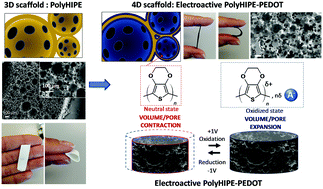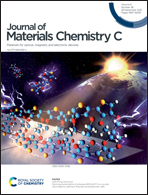4D smart porous scaffolds based on the polyHIPE architecture and electroactive PEDOT†
Abstract
3D porous polymeric materials have a wide range of applications and can be obtained from different approaches as passive materials, permanently set after fabrication. Stimuli-responsive materials give the opportunity to implement a 4th dimension to these materials, providing dynamic characteristics due to the changes in their shape, morphology, pore size or mechanical properties under external stimulation. In this work, the functionalization of 3D scaffolds with an electroactive polymer, the poly(3,4-ethylenedioxthiophene) (PEDOT), has been explored. This conductive polymer which is responsive to electrical stimulation appears as a convenient trigger for several applications, due to its ease of integration and control and its biocompatibility. 3D porous materials based on polymerized high internal phase emulsion (polyHIPE) have been successfully prepared through emulsion templating, leading to materials with highly interconnected and open porosity. The polyHIPE composition is chosen to provide soft and compliant scaffolds, compatible with the functionalization, electrochemical stimulation and electromechanical deformation of PEDOT. The polyHIPE walls are then functionalized homogeneously with PEDOT without any pore obstruction, conferring excellent electrical and electromechanical properties to the porous material. The resulting 4D smart electroactive polyHIPE demonstrates a porosity variation of 10% in the PBS electrolyte under an electrical stimulation of ±0.8 V. These 4D PolyHIPE/PEDOT electroactive scaffolds pave the way for the development of smart and multifunctional 4D materials for numerous applications, especially in the fields of biomedical devices and cell culture platforms.



 Please wait while we load your content...
Please wait while we load your content...